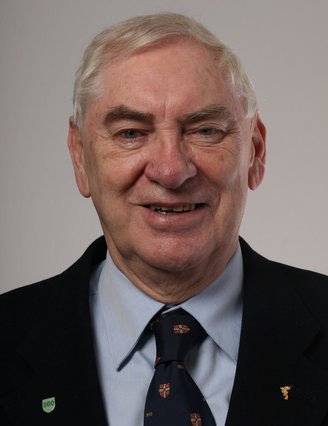Brian Clark has died – marking the end of an era
Professor Brian Frederic Carl Clark, founder of structural biology research at Aarhus University, died on Monday 6 October 2014 aged 78 years.

Brian Clark was active right up until his last days and, in this – his last – year, he was responsible for events including major anniversary symposia in Aarhus, Cambridge and New York. In spring, he celebrated the 40th anniversary of the Division of Biostructural Chemistry, which he set up at Aarhus University in 1974 as a newly appointed professor recruited from the MRC (Medical Research Council) Laboratory of Molecular Biology in Cambridge, and this summer he was coorganiser of a memorial symposium at the New York Academy of Sciences honouring Marshall Nirenberg for his identification of the genetic code.
Professor Clark obtained the degrees of BA, MA, PhD and ScD from the University of Cambridge, UK. He did postdoctoral work in the US at MIT and NIH and then obtained a post at the British Medical Research Council’s Laboratory for Molecular Biology in Cambridge, UK, before being appointed professor at Aarhus University in 1974.
Before coming to Aarhus, Professor Clark worked in collaboration with five different Nobel Prize winners during his career (Lord Todd, Marshall Nirenberg, Francis Crick, Sydney Brenner and Sir Aaron Klug). In point of fact, shortly after the Biostructural Chemistry Division was formed, Francis Crick spent a short sabbatical in the group at Aarhus University.
His research focused on the molecular mechanism of protein biosynthesis (being the first person to crystallise a nucleic acid for structural determination) and later on the human ageing process. Earlier in Cambridge, he collaborated with Professor Kjeld Marcker on the elucidation of the coding signal for the initation of protein biosynthesis. Together with scientists including Kjeld Marcker, he identified the formylmethionine initiation of protein synthesis. During that time, Professor Marcker persuaded Brian Clark to come to Aarhus University to establish a new area of research.
In 1974, Professor Clark gathered a large circle of researchers in Aarhus and, at an early stage, turned the Division of Biostructural Chemistry into an international research environment with close links to other leading research environments all over the world. An early breakthrough for the division was solving the structure of the GTP-binding domain of the tRNA-binding protein EF-Tu, which subsequently led to complete structures of EF-Tu and studies of its tRNA-bound complex, which were fundamental in studying G proteins - an area that has since been recognised with several Nobel prizes.
Professor Clark was a strong driving force and advocate of converting basic research to biotechnology, and he took great pride in his work to facilitate and encourage the interaction between academia and biotech companies in Denmark and abroad. He himself was the founder of two biotech companies. In 2011, the department named a seminar series after Brian Clark to recognise his contribution in this area: the Brian Clark Biotech Lectures. In the latter years of his life, he also established strong connections with research environments and research policy forces in countries such as China.
Professor Clark was a citizen of the world with considerable focus on international organisations and contacts. He was widely involved in international activities. He was President of the International Union of Biochemistry and Molecular Biology (IUBMB), Chairman of the Federation of European Biochemical Socities (FEBS), Vice-Chairman of the European Molecular Biology Organization (EMBO) and Vice-President of the European Federation of Biotechnology (EFB).
He was an honorary citizen of the Greek island Spetses, where he was invovled in organising Advanced Courses in Molecular and Cell Biology for 40 years, featuring numerous current and future Nobel Laureates among the list of speakers. In September 2012, a lecture hall at the Spetses Hotel was named after Brian Clark.
Throughout his life, Professor Clark provided young researchers with strong support, and he always considered it a major task to help new generations on the way. Many Danish and foreign researchers in Denmark and abroad have had great benefit of his numerous contacts and encouragement.
Over the years, Brian Clark received prestigious recognitions of his work, and he was a Fellow of the Royal Danish Academy for Science and Letters, Member of the Danish Natural Science Academy and an Honorary Professor of the Beijing Genomics Institute.
In honour of his memory.
Professor Poul Nissen & Director of Communications Lisbeth Heilesen
Department of Molecular Biology and Genetics
Aarhus University, Denmark
